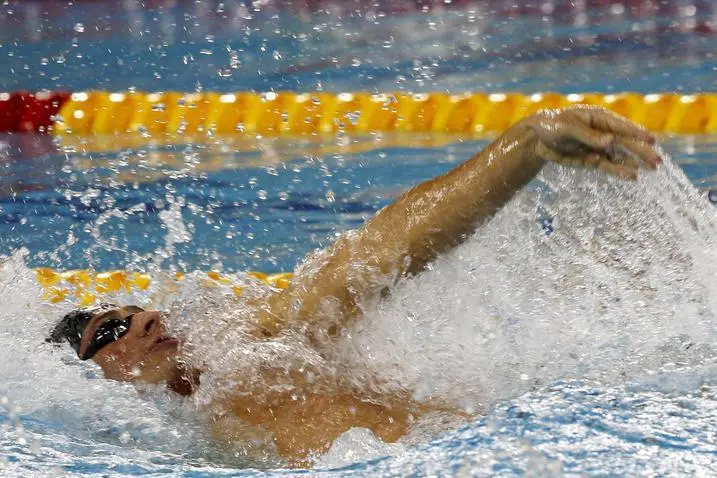PHOTO
Saturday, Sep 03, 2016
One of the most gruelling physical challenges on the planet is to swim 21 miles (32 kilometres) across the Channel from England to France,
Since the first crossing on August 25, 1875 only 1,619 swimmers have successfully completed the gruelling voyage from Shakespeare’s Cliff (near Dover, England) to land at Cap Gris Nez (near Boulogne, France).
Sixty three per cent of these champions have been male and 36.5 per cent female. The average age of a solo swimmer is approximately 34 years.
Daunting statistics that could scare off the most fearless competitors.
But not Egyptian teenager Mohammad Al Husseiny, who twelve months from now with attempt to accomplish the enormous feat.
Then again, Al Husseiny is not your average kid — he was born with Down syndrome, a condition in which extra genetic material causes delays in the way a child develops, both physically and mentally.
However, like many individuals with the condition he is blessed a variety of athletic abilities and levels of agility, in the same way that ordinary people do.
Al Husseiny is a passionate swimmer who is described by his coach and mentor Captain Khalid Shalaby as ‘a strong swimmer with a healthy level of self-esteem.”
Strength is just one of the qualities that the Egyptian youngster must demonstrate in his quest to conquer the ‘Everest’ of long-distance swimming. And his confidence helps him to see the positive in every circumstance and to cope with adversity.
“His toughest challenge will be to handle the cold water of the Channel,” says Shalaby, Chairman of the Stroke for Egypt Academy (SFEA), and the first swimmer with special needs to swim across the Channel with one arm in August 1983.
During the swimming season (between July and September) the water temperatures range from 14 to 18 degrees Celsius.
“Most people with Down syndrome are temperature sensitive and are known to have a problem with cold water,” explains Al Shalaby.” It’s something we have to deal with but is not an impediment. We train early in the morning, around 5am, to allow Mohammad’s muscles to get used to colder water.
“Mohammad may have to work a little harder, and it may take a little longer, but he’s doing fantastic,” says Shalaby who experienced what it felt like to brace low water temperatures when he successful crossed the Channel.
The coach revealed that Mohammad is comfortable with endurance swimming and his training in the Red Sea city of Hurghada has been smooth and uninterrupted.
“He can comfortably swim for five hours non-stop during which he has done well to cope with water currents and colder water,” he said.
“We will keep up this routine three times a week — every Sunday, Tuesday and Friday.”
“Gradually, we will increase the distance, to six hours, eight, ten and hope that by December-January, he can endure over 12 hours.”
Shalaby says he is using cross-country running to boost El Husseiny’s cardio and has worked out a schedule that he hopes will reap the benefits.
“There is no way around hard conditioning when you’re training for something as serious as the Channel swim,” he says. “It’s not a leisure event. It requires dedication and Mohammad realises that he has to put in that extra effort. And he has.
“He’s been training in the mountains, which helps to open up his chest and improve his breathing. It will help strengthen his lungs and increase his overall physical endurance.
“He’s happy and he’s more than willing to put in the hard work. But we’re taking it one step at a time. I don’t want to push him too hard,” he adds.
Shalaby believes that the all-round support El Husseiny has been receiving is a major plus in building the youngster’s confidence.
“His mother is his biggest fan, his pillar of strength,” says Shalaby. “It’s a love story. We’re all working with Mohammad as a family. We do it with love and believe that God is protecting all of us.”
El Husseiny’s Channel bid is supported by the American University in the Emirates (AUE) and its President and CEO Professor Muthanna G. Abdul Razzaq.
“AUE is a place where dreams come true and we work to graduate leaders, that is why I am proud to support such a brave and hardworking person like Mohammad Al Husseiny.
“I believe that 13 swimmers with special needs have crossed the Channel but what Mohammad will attempt to accomplish is phenomenal and worth of a Guinness record.
“We at AUE believe that the University is not only about teaching but by also about helping young people to realise their ultimate goals.”
Shalaby thanked the AUE chief for his support and said: “Prof. Muthana is standing with us in this incredible journey. He is a constant source of support and encouragement.
“He is a very respectable man with a good heart and it shows in his endeavour to financially support Mohammad and help make his dreams come true.
“I think a lot of people are looking at Mohammad for inspiration, not just in Egypt but in the UAE and around the world as well. According to his promise he hopes to give grace and glory to everyone when he crosses the Channel next year.”
By Leslie Wilson Jr Special Features Writer
Gulf News 2016. All rights reserved.





















